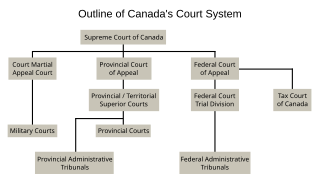Administrative law is the body of law that governs the activities of administrative agencies of government. Government agency action can include rule making, adjudication, or the enforcement of a specific regulatory agenda. Administrative law is considered a branch of public law.

The Court of Cassation is one of the four courts of last resort in France. It has jurisdiction over all civil and criminal matters triable in the judicial system, and is the supreme court of appeal in these cases. It has jurisdiction to review the law, and to certify questions of law, to determine miscarriages of justice. The Court is located in the Palace of Justice in Paris.
In common law systems, a superior court is a court of general competence which typically has unlimited jurisdiction with regard to civil and criminal legal cases. A superior court is "superior" relative to a court with limited jurisdiction, which is restricted to civil cases involving monetary amounts with a specific limit, or criminal cases involving offenses of a less serious nature. A superior court may hear appeals from lower courts.

The Animal and Plant Health Inspection Service (APHIS) is an agency of the United States Department of Agriculture (USDA) based in Riverdale, Maryland responsible for protecting animal health, animal welfare, and plant health. APHIS is the lead agency for collaboration with other agencies to protect U.S. agriculture from invasive pests and diseases. APHIS is the National Plant Protection Authority for the U.S. government, and the agency's head of veterinary services is Chief Veterinary Officer of the United States.
The following list outlines the structure of the federal government of Canada.

The court system of Canada forms the judicial branch of government, formally known as "The Queen on the Bench", which interprets the law and is made up of many courts differing in levels of legal superiority and separated by jurisdiction. Some of the courts are federal in nature, while others are provincial or territorial.
An administrative law judge (ALJ) in the United States is a judge and trier of fact who both presides over trials and adjudicates the claims or disputes involving administrative law.
In France, career judges are considered civil servants exercising one of the sovereign powers of the state, so French citizens are eligible for judgeship, but not citizens of the other EU countries. France's independent court system enjoys special statutory protection from the executive branch. Procedures for the appointment, promotion, and removal of judges vary depending on whether it is for the ordinary or administrative stream. Judicial appointments in the judicial stream must be approved by a special panel, the High Council of the Judiciary. Once appointed, career judges serve for life and cannot be removed without specific disciplinary proceedings conducted before the Council with due process.

The federal judiciary of the United States is one of the three branches of the federal government of the United States organized under the United States Constitution and laws of the federal government. Article III of the Constitution requires the establishment of a Supreme Court and permits the Congress to create other federal courts, and place limitations on their jurisdiction. Article III federal judges are appointed by the president with the consent of the Senate to serve until they resign, are impeached and convicted, retire, or die.

The Audiencia Nacional is a centralised court in Spain with jurisdiction over all of the Spanish territory. It is especialised in a certain scope of delinquency, having original jurisdiction over major crimes such as those committed against the Crown and its members, terrorism, forgery of currency, credit and debit cards and checks, some trade crimes committed in more than one region and over drug trafficking, food frauds and medical frauds committed in a nationwide level as well as over international crimes which come under the competence of Spanish courts.. It has also appellate jurisdiction over the cases of the Criminal Chamber of the National Court.
In law, the standard of review is the amount of deference given by one court in reviewing a decision of a lower court or tribunal. A low standard of review means that the decision under review will be varied or overturned if the reviewing court considers there is any error at all in the lower court's decision. A high standard of review means that deference is accorded to the decision under review, so that it will not be disturbed just because the reviewing court might have decided the matter differently; it will be varied only if the higher court considers the decision to have obvious error. The standard of review may be set by statute or precedent. In the United States, "standard of review" also has a separate meaning concerning the level of deference the judiciary gives to Congress when ruling on the constitutionality of legislation.

The police tribunal is the traffic court and trial court which tries minor contraventions in the judicial system of Belgium. It is the lowest Belgian court with criminal jurisdiction. There is a police tribunal for each judicial arrondissement ("district"), except for Brussels-Halle-Vilvoorde, where there are multiple police tribunals due to the area's sensitive political situation. Most of them hear cases in multiple seats per arrondissement. As of 2018, there are 15 police tribunals in total, who hear cases in 38 seats. Further below, an overview is provided of all seats of the police tribunal per judicial arrondissement.

The Upper Tribunal is part of the administrative justice system of the United Kingdom. It was created in 2008 as part of a programme, set out in the Tribunals, Courts and Enforcement Act 2007, to rationalise the tribunal system, and to provide a common means of handling appeals against the decisions of lower tribunals. It is administered by Her Majesty's Courts and Tribunals Service.

The judiciary of Belgium is similar to the French judiciary. Belgium evolved from a unitary to a federal state, but its judicial system has not been adapted to a federal system.
An Administrative Monetary Penalty is a civil penalty imposed by a regulator for a contravention of an Act, regulation or by-law. It is issued upon discovery of an unlawful event, and is due and payable subject only to any rights of review that may be available under the AMP's implementing scheme. It is regulatory in nature, rather than criminal, and is intended to secure compliance with a regulatory scheme, and it can be employed with the use of other administrative sanctions, such as demerit points and license suspensions.

Guindon v Canada2015 SCC 41 is a landmark decision of the Supreme Court of Canada on the distinction between criminal and regulatory penalties, for the purposes of s.11 of the Canadian Charter of Rights and Freedoms. It also provides guidance on when the Court will consider constitutional issues when such had not been argued in the lower courts.











